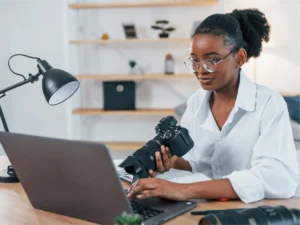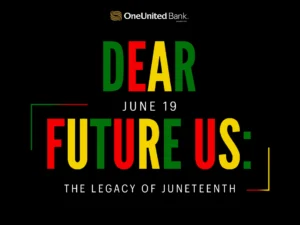Captain: Oh my god. What a morning show we got here today. Anyhow, I know we have Teri Williams on the phone, President of OneUnited Bank. Teri, good morning. You happened to call in the middle of typical Captain and Company rant about something silly.
Teri Williams: (laughing) Good morning. Good morning to everyone.
Captain: How are you doing, Teri?
Teri Williams: I’m doing great. I’m doing great. Probably not as good as you, but I’m doing very well. Thank you.
Captain: No, you sound very happy today.
Teri Williams: Yeah, I am happy.
Captain: I like to hear happy people on our show.
Teri Williams: Oh good.
Captain: I almost want to say if you’re happy and you know it, clap your hands!
(laughter)
Well anyhow, Teri is President of OneUnited Bank, and I did not know that this is the largest black-owned bank in America.
Co-host: I did not know that, but I didn’t even know that we had a black-owned bank in America. The only one that I remember is …the Latinos owned Banco Popular.
Teri Williams: Oh yes. Well OneUnited is the largest black-owned bank. We’re in Florida, Massachusetts, Boston and LA. And we’re also online.
Captain: Wow, now tell us, tell us a little bit about OneUnited Bank, and also tell us a little bit about how to repair people’s credit and get off to a good start in 2014.
Teri Williams: Yes. Ok, well first of all OneUnited is…not only are we black-owned, we’re also a community development bank. Our focus is on building communities. And helping communities grow, especially minority communities, but really all communities. We just started launching January 15th, so tomorrow, something called the UNITY Visa card, which is a secured credit card and a How to Rebuild Credit program.
Captain: Well, I need that.
Teri Williams: Yeah the reason that we’re launching it is exactly the reason you said. This is usually the beginning of the year, we all take a moment and assess where we are financially. And one of the things that a lot of us find is that our credit really is bad. And there are a lot of reasons for that. Some of us have made mistakes in the past. Some of them is that we don’t know you know how to manage our credit or what really matters when it comes to credit. For all these reasons, we have developed this program to really help people build their credit. And the key too is that you need to have information. It’s more than a card. It’s a credit card. It’s a Visa card. Not a prepaid debit card, which a lot people get when they mess up their credit. But a prepaid debit card can’t help you rebuild your credit. Whereas a Visa credit card can, so it is a credit card, but more than that, it’s also information to help you figure out credit – to really get the skinny on how it works, so that you can better measure your credit going forward.
Captain: So this Visa card would actually help somebody who is trying to get their act together, who is trying to get their small business up and running, trying to report to their credit bureaus on what their credit is all about. I’m totally confused about CreditKarma and FreeCreditReport.com and all this and that. You know.
Teri Williams: Yeah. Yeah. Some of those programs are gimmicks. There is actually a website. It’s called AnnualCreditReport.com, and it’s an actual website that is offered by the credit agencies because by law they have to provide you with a free credit report. And so I really encourage people to go there, AnnualCreditReport.com as opposed to the gimmicky sites that advertise. But everyone should get a copy of their credit report. Now I will tell you that most people really are uncomfortable because they don’t want to see what’s on it, but what you find if you get your credit report, there are some things they find that are incorrect, and that are dragging down your credit score. You know, it could be someone with a similar name as yours. It could be some credit that you paid off, but that the company, the bank or the credit union never reported that you paid it off. I mean, there could be all kinds of things that are dragging down your credit, so I really encourage people to get a copy of their credit report.
Captain: Ok, Paulie, it looks like you want to ask a question.
Co-host: No, I’m good because she was very thorough. What you were saying about the secured credit card, I was thinking like it was a prepaid Visa credit card or something like that, but you cleared everything up for me.
Teri Williams: Well, you know, in some ways it’s similar in that you do put a deposit – a security deposit – for the card. So, in that way, it is like prepaid where you put in money and you get a card.
Co-host: But you establish credit?
Teri Williams: For instance, the secured card reports to the credit bureau, and it’s actually a real credit card. Sometimes with the prepaid card, you know, you go and try to rent a car or buy something online, and they say no, we don’t take that. Whereas with the credit card, it’s just like any credit card, and nobody knows that there’s a security deposit behind it. That’s my point. It’s a credit card, and the benefit, in addition to being able to use it anywhere is that we report to the three major credit bureaus, so it’s like new credit that you’re managing better than in the past. And better management gets reported to the bureaus, so it increases your credit score.
Captain: So basically, if you put $100 down, how much would you give them in terms of credit – $200?
Teri Williams: No, it’s actually the same: 1 for 1. And actually the minimum is $300. So the minimum amount you can put down is $300, and the maximum is $10,000. Now you say, who has $10,000 to put down for a deposit, but there are a lot of people who have a lot of money but bad credit, and they want to spend their money and want to buy things on their credit card, but they can’t because they have bad credit. So it’s for people who want to have a small deposit. I mean $300, I know, isn’t small to everyone, but it’s relatively small to a larger deposit, which is up to $10,000. Because what also happens, and this is very important, is that people from all walks of life have been impacted from this recession.
Captain: You ain’t lying about that.
Co-host: I have one question real quick. Is that how long does it really take you – let’s say you’re below 600 on your credit score – and you’ve been bad on your credit cards? You know you may have done consolidation or declared bankruptcy or did whatever you did. How long, on average, would you say that if you put down like $500 down on your credit card, and let’s say I go out, and I buy gas at Walmart and I buy food or whatever? Say I average $300 or $400 a month in purchases but keep a $500 balance on that card. How soon would I be able to get legitimized credit?
Teri Williams: Yeah, that’s a very good question, and let me just answer first and I have some more. It can take up to six months to a year to see significant improvement on a credit score.
Co-host: So basically, though, with you doing the tracking, you can show it would improve your credit, because it’ll show that you’re actively doing credit purchases and transactions and you’re paying basically what you would be paying on a credit card balance, keeping the card filled and you’re making obligations?
Teri Williams: Yes. Right, the idea, and I apologize, the idea is to track your credit score. Some people have said they’ve seen a difference in 90 days, so it could be very short. Others have said that it can take a little longer.
Co-host: I’ve been on both sides of the fence. I’ve had bad credit. I’ve had two divorces, so trust me when you go through a divorce and things go bad, you’re not coming out pretty all of the time, so I was wiped out on my second divorce. I’ve been where people have been, wiped out, and I made a comeback, so you just got to be diligent, and you don’t buy stuff that you can’t afford, but you want to keep an active thing. The main thing is even if you have a bad month, I think if people notify their creditor and say I’m going to make good on this. If you give them a heads-up on things, it’s not going to be as bad as not doing anything to pay the bill. Heads-up to people: if you don’t have the money, contact the credit card company. “Hey I don’t have the money. Don’t hold it against me.” Usually they’ll work with you.
Teri Williams: Yes, they will. You’re a great example because, first of all, usually it’s something that has happened in your life. It could be the loss of a job. In your case, you’re saying it was a divorce. Usually it’s some event that’s happened as opposed to who you are as a person. And that’s something important for people to not get upset or in the mindset that, you know, I have bad credit. I’m a bad person. Absolutely not. What has happened, usually, is that something has happened in your life that in some cases you don’t even have control over. And so you have been doing fine, but you hit a bump in the road. So that’s very common, and those are the people that we can help the most because it’s really getting over that bump is what we’re really trying to help them to do. So that’s the first thing that you said that really I think is where most people are. And then the second thing is that you proactively worked on it. And that’s what we want to say to people. Don’t put your head in the sand. That actually you can come back. And that you’re coming back really can last a lifetime.
Co-host: Yes it can. I got divorced in 91 and like I said, I was driving an old beat up car. After I did a year, I would get a brand new Honda Prelude. It took about a year, but sometimes you gotta suffer, scale back and bite the bullet for a year. Then you can bounce back. What you’re doing with this credit card is good. People can show that they have established credit – that they have rectified their situation and can get back on their feet.
Teri Williams: Absolutely.
Captain: I’m shocked to hear all of this information, and I’ve been on this morning show for how many years, Paulie?
Co-host: Well because you think that I’m white, so my life has been a bed of roses. I’ve had bumps on the road.
Captain: I’ve just been poor and black and loud. That’s been my problem. But Teri, tell folks how they can get a hold of you because I’d like to talk to you off the air. I’ve got an idea for Teri.
Teri Williams: Okay, great. You can go online to <http://www.unityvisa.com, and that’s where all the information is on the program. You can also Like Us on Facebook. We’re on http://facebook.com/unityvisa. On Facebook, we provide information on how you can rebuild and create some financial resolutions for the New Year. And OneUnited Bank, we have branches in Miami, Boston, and LA. We’re also online at https://www.oneunited.com. We’re here to serve, so we look forward to hearing from all of you.
Captain: That’s Teri Williams, President of OneUnited Bank. Thank you for being on Captain & Company.
Teri Williams: Thank you!


















